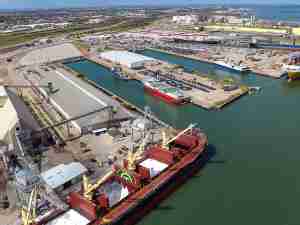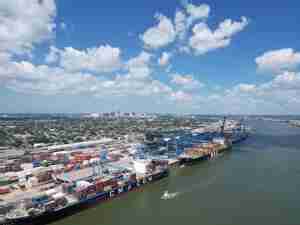The operator of Saudi Arabia’s Red Sea Gateway Terminal is looking to invest in ports in Africa and the Middle East, following backing from the kingdom’s sovereign wealth fund.
The RSGT plans to invest in at least three international ports in the next five years, with each investment totaling as much as $500 million, port chief Jens Floe said. It’s also aiming to spend up to $1.7 billion developing its main port in Jeddah on the Red Sea, as well as potentially investing in other Saudi ports.

Saudi Arabia’s Public Investment Fund and Cosco Shipping Ports bought a stake in RSGT in January, valuing the port operator at about $880 million. The wealth fund is leading a strategy to turn the kingdom into a transport and logistics hub and support local companies looking to export products. The pandemic has also led to a renewed focus on food security in the region, where the desert environment means many countries rely on agricultural imports.
“Adding Cosco and PIF as shareholders will really accelerate our domestic and our international growth plans,” Floe said in an interview. He said investments may come in rail and dry ports, and emerging market terminals in “less mature and less organized ports.”
Part of RSGT’s strategy will be geared toward supporting the kingdom’s food security plan. The PIF transfered $2.7 billion of food and agriculture assets into Saudi Agricultural & Livestock Investment Co. earlier this year as part of efforts to streamline food security efforts. The fund has also invested $4 billion in energy, mining, telecoms, food and other industries in Africa, Saudi Crown Prince and PIF Chairman Mohammed bin Salman said last week.
“Quite a few of the wider government strategies, like food security, lend themselves very well to our strategy,” Floe said. “We have a focus on ports in Sudan and Egypt. They weren’t picked for that reason, but they happen to be significant countries for Saudi Arabia’s food security strategy.”
The RSGT handles 5.2 million 20-foot (6 meters) equivalent units a year, with a plan to grow that to 9 million by 2050. Expanding internationally would increase competition with Dubai-based port operator DP World, which already owns assets in the Middle East and Africa, including a neighboring terminal in Jeddah.
“There’s no doubt that partnering with PIF will position us better in areas like North Africa,” Floe said.










